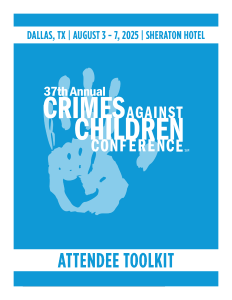Workshop
Marriott
Responding to Suicidality at the CAC: Considerations for Forensic Interviewers
Monday, August 4, 2025
12:00 PM – 1:15 PM CT
Location: Preston
Earn 1.25 Credit Hours
Target Audience: Forensic Interviewer, Therapist, CAC

Lydia Johnson Grady (she/her/hers)
Program Manager for MDT Development
Southern Regional CAC, National Children's Advocacy Center
Primary Presenter(s)
Child abuse professionals often feel ill-equipped to handle cases in which suicidality is a factor, and many forensic interviewers feel uncomfortable, uncertain, or challenged when children make statements about suicidal thoughts or behaviors. Staff at some Children’s Advocacy Centers report that their teams respond reactively, rather than proactively when encountering these children and families. Fortunately, research over the past two decades on providing social support in the forensic interview, combined with research and practice guidance from related mental health and suicide prevention fields, offer insights into how we might craft appropriate and defensible responses to concerning statements in the forensic interview setting.
During the presentation, we will review suicide terminology, prevalence and risk factors, suicide screening and assessment, information gathering, and interview modifications. The presenter will offer recommendations for navigating concerning statements in the forensic interview room using a four-step response strategy that aligns with current forensic interviewing best practices. Participants will learn how to approach these sensitive situations with empathy, humility, and confidence while fostering a coordinated team response for comprehensive support.
During the presentation, we will review suicide terminology, prevalence and risk factors, suicide screening and assessment, information gathering, and interview modifications. The presenter will offer recommendations for navigating concerning statements in the forensic interview room using a four-step response strategy that aligns with current forensic interviewing best practices. Participants will learn how to approach these sensitive situations with empathy, humility, and confidence while fostering a coordinated team response for comprehensive support.
Learning Objectives:
- Explain the differences between suicide screening and suicide assessment.
- Name four steps to responding to concerning statements in the forensic interview.
- Plan for appropriate immediate and ongoing support after a child makes a concerning statement in a forensic interview.

